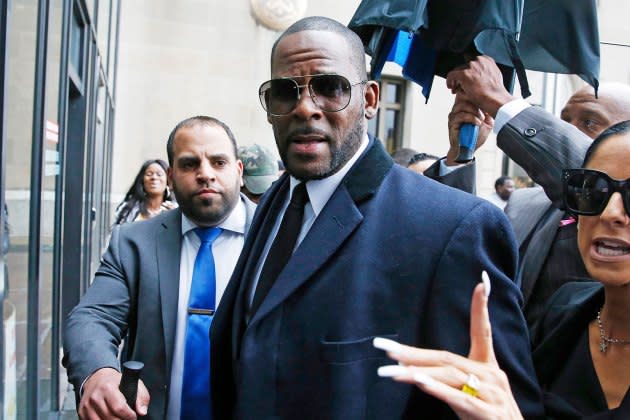R. Kelly Sex Abuse Appeal: Star’s Attorney Says Feds Are Pushing RICO Laws ‘to the Point of Absurdity’
- Oops!Something went wrong.Please try again later.

R. Kelly’s attorney on Monday (Mar. 18) urged a federal appeals court to overturn the singer’s sexual abuse convictions, warning that the case against Kelly stretched federal racketeering laws “to the point of absurdity” and could potentially turn college fraternities into illegal conspiracies.
At a hearing before the Court of Appeals for the Second Circuit, lawyer Jennifer Bonjean told a panel of judges that Kelly’s employees had just been “unwitting” staffers performing “anodyne” tasks for a famous person, not a group with a criminal “purpose” like the Mafia or a drug cartel.
More from Billboard
R. Kelly Sues Federal Prison Bureau for Allegedly Leaking Private Info to YouTube Host
Jimmie Allen Sexual Assault Accuser Agrees to Drop Lawsuit Against Country Star
Black Eyed Peas & Daddy Yankee Hit With Lawsuit Over Alleged Illegal Sample From 'Scatman' Song
Seeking to reverse Kelly’s conviction under the federal RICO law (Racketeer Influenced and Corrupt Organizations Act), Bonjean accused prosecutors of using that law in a “preposterous” new way.
“The government has extended the RICO statute to a set of circumstances that is so beyond what the framers intended, which was to get at organized crime,” Bonjean said. “Now, we’re talking about an organization with an alleged criminal, but not organized crime.”
After decades of accusations of sexual misconduct, Kelly was convicted in September 2021 on nine RICO counts related to accusations that the singer had orchestrated a long-running scheme to recruit and abuse women and underage girls. In 2022, he was sentenced to 30 years in prison.
At Monday’s hearing, Bonjean repeatedly told the judges that the government had failed to prove that members of Kelly’s organization knew crimes were being committed, meaning the RICO law didn’t apply. She said, for instance, that staffers didn’t know any of the women were underage.
But Assistant U.S. Attorney Kayla Crews Bensing, arguing back for the government, sharply rejected that claim: “The defendant had a system in place that lured young people into his orbit and then took over their lives,” she told the judges.
Bensing pointed to specific evidence that members of Kelly’s organization had been aware of the organization’s ill intent. She cited testimony that one victim had been approached by a member of Kelly’s entourage at a McDonalds, that she told him that she was only 16 years old and that he had then given her Kelly’s number and told her to call him. Another Kelly employee testified that he had answered phones for “Kelly’s girlfriends,” Bensing said, some of whom he identified as “mid-aged teenagers.”
“This is all evidence that the jury was entitled to infer that Kelly’s inner circle knew what was going on: that he was recruiting and maintaining underage women for sexual activity,” Bensing said.
Kelly faces long odds in his battle to topple his conviction, as federal appeals courts only overturn a small percentage of the convictions that are appealed each year. But Bonjean has had success in such cases in the past, most notably winning a 2021 ruling that overturned Bill Cosby’s 2018 sex assault conviction.
Following Monday’s arguments, the court will issue a ruling in the coming months.
Like in many appeals, large parts of Monday’s hearing were spent wrangling over in-the-weeds legal issues, like whether a single sexual act could fit the definition of “forced labor” under federal law, or whether Bonjean even had a procedurally proper way to fight her appeal since Kelly’s previous attorneys had failed to challenge the instructions given to the jury at trial.
On her main point about whether RICO requires an illicit “purpose,” Bonjean repeatedly faced pushback from the judges. The judges pointed out on multiple occasions that there is no written requirement that the law only be used against outright criminal organizations, and one judge specifically noted that labor unions had been repeatedly charged with violating RICO.
“RICO is looking at organizations, that are then used to commit criminal acts,” Judge Denny Chin said. “It doesn’t have to be a criminal organization. It could be a completely legitimate organization. But if it engages in racketeering activity, it violates RICO.”
But Bonjean remained adamant, arguing that the statute could not be brought to bear against an organization like Kelly’s, which she said merely had the purpose of promoting his musical career and personal brand.
“This was not a collection of people who had a purpose to recruit girls for sexual abuse,” Bonjean said. “Whether they turned a blind eye, whether some of them suspected that some of these girls were underage, that’s a whole different matter.”
“Once we get into that sort of territory, where we’re going say that that constitutes a RICO enterprise, we have a lot of organizations, we have a lot of frat houses, we have all types of organizations that are now going to become RICO enterprises,” Bonjean added.
Pushing the point further, Bonjean said that such an approach would have allowed federal prosecutors to charge infamous Ponzi scheme perpetraor Bernie Madoff with RICO violations rather than the slew of fraud charges he actually faced. At that point, Judge Richard J. Sullivan cut in.
“Well, he got 150 years,” Sullivan said. “I don’t think that it mattered.”
Best of Billboard
Four Decades of 'Madonna': A Look Back at the Queen of Pop's Debut Album on the Charts
Chart Rewind: In 1990, Madonna Was in 'Vogue' Atop the Hot 100

